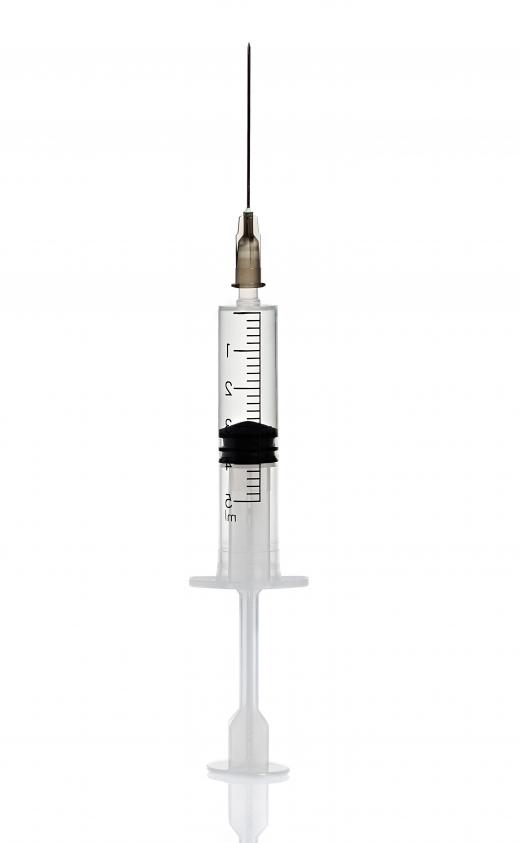At AllThingsNature, we're committed to delivering accurate, trustworthy information. Our expert-authored content is rigorously fact-checked and sourced from credible authorities. Discover how we uphold the highest standards in providing you with reliable knowledge.
What Are the Uses of Ivermectin for Horses?
Ivermectin for horses is one of the most effective methods for the treatment and prevention of parasites. The drug works to combat 35 different parasitic organisms, including strongyles, multiple types of worms, and bots. The worms that it can treat and control include pinworms, lungworms, and intestinal hairworms. It is considered safe for use in all horses, although the manufacturers recommend against using it in animals that are meant for food. Ivermectin paralyzes the neurotransmitter gamma-amino-butyric acid (GABA) in parasites. This acid is unique to parasitic organisms, and therefore a typical ivermectin dose will not affect vertebrates such as horses. It can prevent new infections from parasites and also works to destroy active infections.
Owners can purchase ivermectin for horses in a paste form. It is often sold in a plastic syringe, which will contain enough of the drug for one or more fully grown horses. To administer the drug, the syringe tip should be inserted into the horse’s mouth. The paste is then injected onto the back of the animal’s tongue. Owners are often advised to then hold the horse’s head up so it can’t spit the medicine out. It is considered very difficult to cause an overdose when using ivermectin for horses. Animals have been known to ingest up to nine times the recommended dosage with no side effects. Administration of ivermectin for the control of parasites can begin when the horse is as young as six to eight weeks of age.

The drug is so effective at controlling parasites that veterinarians often recommend swapping it out for another treatment type occasionally. The concern is that parasites will eventually develop a resistance to ivermectin for horses, rendering it ineffective. At the same time, vets caution against rotating dewormers too frequently and say that this could cause parasites to develop resistances to multiple drugs at once. The recommended course of action is to work closely with a vet when administering a deworming treatment program for horses.

The use of ivermectin for horses has occasionally been known to cause side effects. Swelling and itching have happened in some horses after they’ve been treated with ivermectin for thread neckworm microfilariae. It is believed that the reactions were due to large numbers of the microfilariae dying off all at once. Ivermectin is considered extremely safe for horses, but humans are cautioned to wash their hands after handling the drug. Used ivermectin syringes should not be disposed of in a water source because of the potential to harm or kill invertebrates in the water.
Frequently Asked Questions
What is ivermectin and how is it used in horses?

Ivermectin is an antiparasitic medication widely used in veterinary medicine, particularly for horses. It's effective against a broad range of parasites, including bots, lungworms, and intestinal worms. Administered as an oral paste or injectable, ivermectin disrupts the nerve and muscle function of parasites, leading to their elimination from the animal's body.
Can ivermectin prevent heartworm in horses?

While ivermectin is a go-to medication for preventing heartworm in dogs, heartworm disease is not commonly diagnosed in horses. However, ivermectin can be used off-label to target the larvae of heartworms if a horse is affected, under the guidance of a veterinarian. It's crucial to follow professional advice for dosage and administration.
How often should horses be treated with ivermectin?
The frequency of ivermectin treatment in horses depends on various factors, including the parasite load, the horse's environment, and local parasite resistance patterns. Generally, veterinarians recommend deworming horses every 6 to 8 weeks with ivermectin, but this can vary. A fecal egg count test can help tailor the deworming schedule to the horse's specific needs.
Are there any side effects of using ivermectin in horses?
Side effects of ivermectin in horses are rare when used at the recommended dosages. In some cases, horses may exhibit signs of discomfort or allergic reactions, especially if they have a high parasite burden. Overdosing can lead to toxicity, so it's essential to dose accurately based on the horse's weight and to consult a veterinarian if any adverse reactions occur.
Is ivermectin safe for all horses?
Ivermectin is generally safe for most horses; however, certain breeds, like Collies and some herding dogs, have a genetic sensitivity to ivermectin due to a mutation in the MDR1 gene. While this mutation is less common in horses, it's important to consult with a veterinarian before administering ivermectin to ensure it's safe for your specific horse.
Can ivermectin resistance develop in horse parasites?
Yes, ivermectin resistance in horse parasites is a growing concern. Continuous use of ivermectin can lead to the selection of resistant parasite populations. To combat this, strategic deworming practices are recommended, which may include rotating between different classes of dewormers and performing regular fecal egg counts to minimize unnecessary treatments.
AS FEATURED ON:
AS FEATURED ON:














Discussion Comments
@rundocuri- Just like the article says, some horses will experience side effects from Ivermectin but this is usually the case when horses already have cases of parasites. When given on a regular basis as a parasite preventative, Ivermectin rarely causes any side effects.
As a matter of fact, Ivermectin is a very safe parasite preventative. It is also the main ingredient in my brands of canine heart worm preventative, which dogs take safely each month.
Does anyone know how frequently horses have side effects to Ivermectin? I am getting a horse for the first time this summer, and I want to make sure do what is necessary to prevent parasites. I also want to know what to expect when I give her this drug.
Post your comments